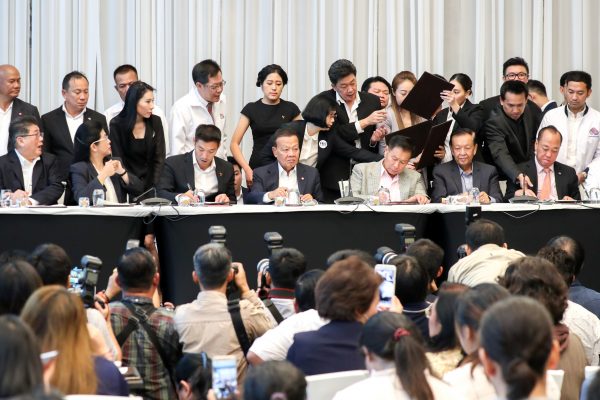Despite this lack of fairness, on 27 March a seven party anti-junta coalition, led by the pre-coup governing party Pheu Thai announced that they were likely to win a majority of seats in the House of Representatives and that they intended to form government. This development is promising as it shows that there is political will to end junta dominance. It does not, however, mark a return to genuine democracy. Even if this group is allowed to govern, they will have to govern under a non-democratic constitution and likely with the junta leader as prime minister.
There also remain many ways that the rights of this group may be further impeded. Vote counts may mysteriously change. The elections may be invalidated by exercise of Article 44 or due to irregularities. And, even if the results stand, junta-enacted laws may be used to obstruct the parties.
To understand the impact that junta-enacted laws may have, it is useful to consider the impact that one of the laws has already had. On 7 March, the Constitutional Court relied on one of the laws to dissolve Thai Raksa Chart — a party understood to have split from Pheu Thai in order to maximise the chance that between them the parties may win enough seats to form government.
Some have portrayed this dissolution as a continuation of a form of politics prevalent in Thailand since at least 2006. That the dissolution was achieved under a new law was, however, significant.
The new law applied in the case required that if parties engaged in acts that ‘may be adverse to the democratic regime of government with the King as Head of State’ they must be dissolved (Section 92(2) of the Organic Act on Political Parties B.E. 2660 (2017)). The law was draconian, both because it set the bar for dissolution very low, and because it denied the court discretion.
Before the 2014 coup, the closest law set the bar higher, requiring that parties engage in acts ‘in order to overthrow the democratic regime of government with the King as Head of State’. It also gave the court more discretion, providing only that it may dissolve parties, not that it must.
Before the 2014 coup, the court sometimes used that discretion. A notable example is in cases decided between 2012 and 2014, in which the court used that law to block abusive constitutional amendments, but did not dissolve the parties that had proposed or supported the amendments.
In contrast, in the Thai Raksa Chart case, despite finding that Thai Raksa Chart had not intended to overthrow or to oppose the democratic regime of government with the King as Head of State, had withdrawn its action and had not caused serious harm, the court dissolved the party. While some reasons given by the court were overly broad, it must be conceded that for the court to have not dissolved the party the court would have had to read the law against its clear terms.
Since 2006, discussion of the role of Thai courts in political cases has tended to focus heavily on the role of judges, and not on ways that judges may have been constrained by the laws that they have had to apply or the cases that have come before them. The laws and cases have, however, had an impact. It is only by recognising this that the current situation can be appreciated.
Before 2014 there were already laws that set problematic standards. There were also already distortions in the ability of actors to initiate cases. Now, thanks to the junta, however, there are even more problematic laws and even more distortions in the ability of actors to initiate cases.
There are also signs that the laws will be applied unevenly. The junta-appointed Election Commission and Ombudsman have already dismissed dissolution cases against the pro-junta party on grounds that are unconvincing. Meanwhile, dissolution cases against anti-junta parties, the basis of many of which is bizarre, continue to amass, leaving open the possibility of their dissolution.
As these laws continue to be applied, it is important that critiques focus not only on the actions of judges, but also on those of the initiators of cases and on the nature of the laws themselves.
It is also important, if Thai democracy is to have a chance, that such draconian laws be abolished, and that in enacting new laws attention be paid not only to the need to discourage corruption, but also the equally important need to respect the right of the people to make their own choices.
Sarah Bishop is a PhD candidate within the ANU College of Law undertaking research on Thai Constitutional Law focusing on court interpretation of constitutional rights provisions.

